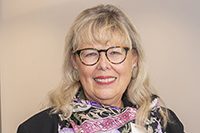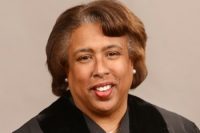
One of the relatively few private attorneys to have argued multiple cases before the U.S. Supreme Court, James G. Sotos (’85), Owner of The Sotos Law Firm, P.C., has achieved an enviable rate of success. A former star on the basketball court, Sotos now stars in the courtroom and has been recognized as an Illinois Super Lawyer and Illinois Leading Lawyer.
JMLS: When and how did you know you wanted to be a lawyer? What was your path to John Marshall?
Sotos: I decided to become a lawyer in the late 1970s when I was living in Athens, Greece, playing basketball. I had a ton of free time, which I filled by reading, so I started reading everything I could get my hands on about Watergate, the political crime scandal that led to the resignation of President Richard Nixon in the middle of his second term. I developed a fascination with the legal process and decided to scratch the basketball path (which was never going to work out in the long run anyway) and pursue a career in law.
The problem with my plan was that up until that time I had been a terrible student and was saddled with a grade point average of less than 1.0 from my first failed attempt at college. So when I told the student advisor at the last of five colleges I attended that I wanted to be a lawyer, he told me to start getting A’s and pray that I did well on the LSAT. Two years later, I applied to John Marshall, and I’ll never forget how thrilled I was to receive the acceptance letter. I’ll always be incredibly indebted to John Marshall for giving me a chance to pursue my dream despite the rocky road I took to get there.
JMLS: You have more than 25 years of experience representing public and private sector clients in federal and state litigation at the trial and appellate levels. What drew you to a career in defense and litigation?
Sotos: Like a lot of law students, I was just hoping to get a job and was rejected everywhere until I finally found a law firm willing to give me a chance. That firm concentrated on representing Illinois public entities and public officials in state and federal litigation. Once I got the job, I dedicated myself to learning everything about that field and to making myself indispensable to the people for whom I worked. Through that process, I became fascinated with the balancing of individual rights versus government interests, which lies at the heart of virtually every civil rights lawsuit. I have long believed that I have been tremendously fortunate to be able to practice in such an important arena, and I cannot envision a more interesting type of litigation than federal civil rights litigation.
JMLS: You have argued two cases in the United States Supreme Court. What were those experiences like?
Sotos: The best way that I can describe the arguments collectively is unforgettable. I remember the duality of emotions I experienced upon learning that certiorari had been granted. On one hand, I was infused with exhilaration knowing I’d soon be arguing before our country’s highest court, where the most momentous cases had been presented and decided. On the other hand, I experienced a wave of disappointment knowing I had to call my clients to tell them that our favorable court of appeals decisions, which had seemed so final, now faced a roughly 50/50 chance of being reversed. You can probably guess which emotion won out once those difficult phone calls were behind me. As far as the arguments themselves, I remember the nervousness, which had me concerned right up until the moment the arguments began, gradually melting away as the argument progressed and how the intimate design of the courtroom itself facilitated an invigorating intellectual conversation, as opposed to an intimidating inquisition.
JMLS: Do you have a favorite memory of law school?
Sotos: Yes, that’s easy—the enduring bonds I formed with several classmates stand above all else as my favorite law school memory. Those bonds were formed during three pressure-packed and often-exhausting years. We learned to support each other when things got tough, even as we competed with each other for grades and positions. Relationships formed under challenging circumstances often last, and I’ll always cherish the life-long friendships I formed with several classmates who I’ve proudly watch move onto productive and satisfying legal careers in a wide variety of fields.
JMLS: You recently participated in the Conversations with the Dean series, sharing your insights into your career and your time at John Marshall. How important is it for you to stay connected to your John Marshall community, alumni, and professors?
Sotos: I’m indebted to John Marshall for giving me a chance to fulfill my dream of becoming a lawyer when many other schools, based on a cold read of my record, wouldn’t take that chance. Once admitted, I was tremendously blessed to have phenomenal professors such as Susan Brody, Tim O’Neill, and Bill Mock, whose infectious enthusiasm for the law and for teaching made law school a time of incredible learning, opportunity, and growth for me. As a result, I have strong feelings of gratitude toward the school and to my professors, which makes me want to continue to be a part of the John Marshall community in any way that I can.
JMLS: Can you tell us one thing that your John Marshall classmates might be surprised to learn about you?
Sotos: This one’s tough. I’ve become close with several of my classmates, who are all very accepting, with whom I’ve shared much of my history, good and bad. So in that sense, I’ve been something of an open book with the classmates with whom I’ve stayed in touch. I suppose some might be surprised to know that I never expected to do as well as I did in law school and that I was convinced that most of them were academically out of my league.
JMLS: Will you share with us some of your hobbies or leisure activities?
Sotos: I love being a lawyer, but my true passion is basketball—from my time playing to coaching all four of my sons and watching all of them play at the same high school and at four different colleges. I still have two playing in college, and my wife, Katy, and I try to get to all of the games. That can be challenging, given that the youngest of the four plays for an east coast school, so I am often trying to rely on my advocacy skills to convince judges to schedule court proceedings around my latest basketball-related adventure. For the most part, they’ve been gratefully accommodating. I also love to read, but rarely find the time between the demands of my law firm and my kids’ basketball games.



